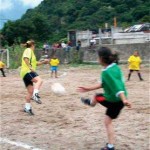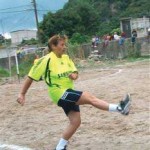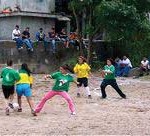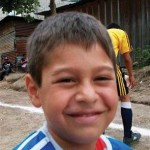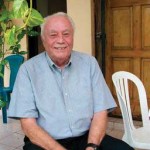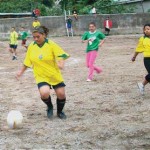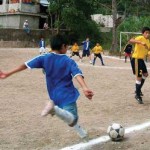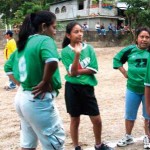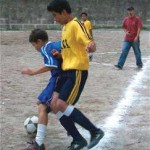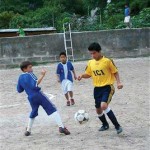FÚTBOL: Barrio Norte Style
text and photos by Dorothy Kethler
Las Manos (The Hands), Los Cuates (Buddies), Talleres (Metal Workers), Areneros (Sand Diggers), Las Muñecas (The Dolls), Los Dragones (The Dragons), these are a few of the 36 soccer teams participating in the Barrio Norte Soccer Project. Every Saturday and Sunday the raucous cheers and thuds of the games can be heard throughout the barrio. There are 350 boys and girls (ages 11-17) and young adults involved, thanks to Willy Lynch, sports lover and patron, and Robin Rodríguez, manager, and Juan of All Trades, himself a former second division professional soccer player and father of four.
Three years ago, after Hurricane Stan decimated Barrio Norte in Panajachel, Lake Atitlán, Willy became concerned that there was nowhere in the barrio for the kids to play and most were just hanging out and headed for trouble. He talked to Don Meme Pablo de León about using some of his land for a soccer field. Don Meme agreed to lend the land, and the locals started moving boulders, tree trunks and other debris left by the flash flood. They hired earth movers to carve out a space 40 by 28 meters (smaller than a regulation playing field). The men raked and leveled as best they could.
Willy provides trophies, medals, chalk for lines, soccer balls and nets, as well as celebratory pizza and sodas after the tournaments. The men, mostly fathers of the kids, maintain the field and provide volunteer referees. If they don’t work, they forfeit their games. What began as a barrio project now involves teams from Jucanyá, Patanatic and other areas, but all the work is done by the people of Barrio Norte. By now most teams have their own uniforms; there are loaner uniforms for those without. Willy hopes to see more fields in other parts of town. The problem is getting land, most of which is privately owned.
This year Willy started a basketball program and held a free basketball clinic when his daughter, Lauren, a physical education teacher in New York City’s Bedford-Stuyvesant area, came for a visit. Sixty kids attended. Lauren plans to return in December because she was so impressed with the kids. “They were respectful, they listened, they were well behaved. There was no arguing or fighting! What a change from up North. Sixty kids up there would have been total chaos!” They now have 10 to 15 teams with both boys and girls (ages 8-15) on the same teams. Annette García, from Australia, is their coach.
Willy, too, comments on the behavior of these youngsters: “There’s no getting into trouble, no smoking, no drinking, no pot. They’re well spoken, polite and they listen. There are no fights in the games and, so far, no injuries. They play rough, but there is no intentional fouling. They are good sports and they have a lot of fun.”
I interviewed some of the kids and found them surprisingly open and forthcoming. Brian, 11, who has been in the program for two years, says “I like to make goals. I have no bad grades, my favorite subject is math. I want to be a computer expert.” Josue, 11, likes being a striker (forward). He gets 60s and 70s in school and wants to be a doctor. Henry, 13, also a striker, says his grades are “some good, some bad.” Spanish is difficult for him. He wants to be a PE teacher. Mario, 13, likes defense. His grades are “satisfactory.” His favorite subject is math and he wants to be a teacher.
The referee that day, Minor, also a former second division player, says it’s very important for kids to play and not get into trouble. “They get very enthusiastic, they don’t want to lose. If the ref is demanding and calls fouls, they listen. If he doesn’t know what he’s doing, they ignore him.” Minor volunteers because sports are important for the community. “If people do only what they are paid to do, you lose the spirit of sport. It’s for the good of the community.” He has been supportive of kids’ sports for the past 15 years.
Robin is the key person, says Willy. “He does all the organizing, schedules, contacts everyone to remind them of games, keeps track of the volunteer commitments—everything, for free. He is also a referee. ”
Willy says volunteer coaches (Spanish speaking) are needed, even for a couple of weeks at a time, as well as money for soccer balls (100-150Q), uniforms (100Q), and shoes for those who can’t afford them. And space to play, even if only for a few years. If you are interested in participating, please email: Willy34@msn.com After all, he says, “It’s fun, good for the kids. I meet lots of people. When you retire to Guatemala, you need to find a passion, a purpose, a way to become a real part of your community. Otherwise you just die.”
